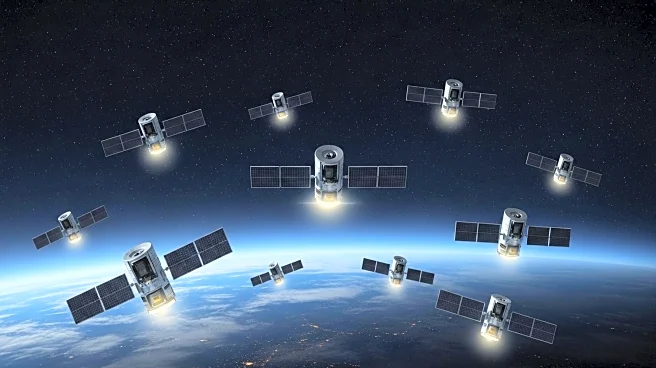What's Happening?
SpaceX launched a Falcon 9 rocket carrying 24 Starlink satellites from Vandenberg Space Force Base in California. The launch occurred on September 6, 2025, at 2:06 p.m. EDT. The rocket broke through a fog layer and reached space approximately eight minutes later. The satellites, part of the Group 17-2 batch, were deployed into low Earth orbit about 53 minutes post-launch. The mission marked the 112th Falcon 9 launch of the year and the 530th since 2010. The first stage of the Falcon 9, booster 1075, successfully landed on the droneship 'Of Course I Still Love You' in the Pacific Ocean, marking its 20th successful touchdown.
Why It's Important?
The launch bolsters SpaceX's Starlink megaconstellation, aimed at enhancing internet connectivity in underserved areas worldwide. With the addition of these satellites, the network now comprises nearly 9,000 units, increasing its capacity to provide widespread broadband access. This expansion is crucial for improving internet services in remote regions, potentially transforming communication and access to information. The successful reuse of the Falcon 9 booster underscores SpaceX's advancements in reusable rocket technology, which could lead to more cost-effective and sustainable space missions.
What's Next?
SpaceX is expected to continue its aggressive launch schedule to further expand the Starlink network. The company aims to enhance global internet coverage, particularly in areas lacking reliable connectivity. Future launches will likely focus on increasing the number of satellites in orbit, improving service quality, and expanding coverage areas. Stakeholders, including governments and telecommunications companies, may respond by exploring partnerships or regulatory measures to integrate Starlink services into existing infrastructure.
Beyond the Headlines
The expansion of the Starlink network raises questions about the long-term impact on space traffic and orbital debris. As the number of satellites increases, concerns about space congestion and potential collisions grow. Additionally, the deployment of global internet services by a private company like SpaceX may influence international telecommunications policies and competition, prompting discussions on regulation and fair access.










